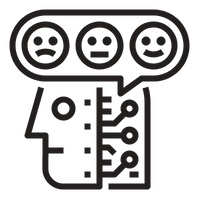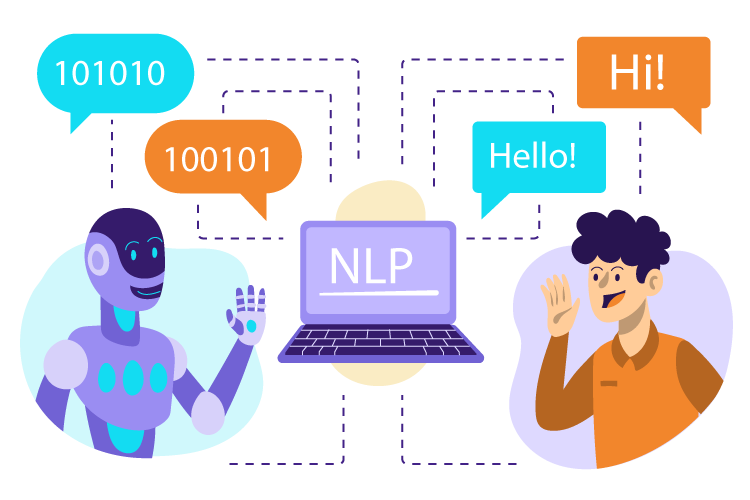The integration of Natural Language Processing in Healthcare has become a necessity with the mountains of unstructured medical data being generated every day. But thanks to AI and Machine Learning, NLP has been showing some promising results. You will be amazed by the possibilities it can showcase!
Much like the high school buddy who would share notes that you missed during classes, NLP has proven itself to be a boon for Healthcare, unveiling dozens of newer possibilities disrupting the status quo. The conjunction of Natural Language Processing in Healthcare with AI-based algorithms like Machine Learning and Deep Learning has made patient care providing a breeze by precisely processing real-time data while maintaining confidentiality. Be it ‘managing large clinical data sets’ or ‘trial matching’ and an array of such aspects, NLP in healthcare has become synonymous with added efficiency and increased accuracy over the past few years.
While it may seem like a long route to take to reap all those benefits, it’s just a set of strategic steps. Details ahead!
Get your free NLP consultation
What is Natural Language Processing?
Now we might be jumping too far for some of us reading this blog. Let’s take a step back and understand Natural Language Processing just to make sure we all are on the same page!
Natural Language Processing is a subpart of Artificial Intelligence that enables a computer to have a conversation with human beings by translating unstructured data with the help of various methods, which we will discuss as we go through this blog! Previously what was only possible through difficult programming languages and long codes can now be easily done with basic instructions with your voice or any other unstructured form. NLP can automate any task that does not need innovation. For any task that can be performed by just looking at the data in hand, NLP will cover it for you. With this technology, the human life form will be able to have more time to give towards the important things in life and leave the repetitive tasks to be handled by these algorithms.

Natural Language Processing in Healthcare
The medical industry has to deal with a large amount of unstructured data every day. This amount of data is pretty hard to be handled by a human alone. If you are familiar with a popular Disney character “Baymax” you would know exactly what we are talking about. It can be viewed as an end goal that NLP in healthcare would like to produce at some point. And who doesn’t love a personal healthcare assistant right? But if we look into what NLP can do for us right now, it is pretty impressive as well. Right now NLPs have the potential to analyze, interpret and suggest medical proceedings with the help of AI, machine learning, and Deep knowledge which saves great amounts of time for any medical organization.
Tools like Nuance Dragon and DeepScribe are being used by medical professionals every day to ensure that all the unstructured data about a patient is efficiently transcribed and recorded while saving hours of individual time that was previously spent on manually transcribing the data can now be used towards something way more productive.
NLP Services in the Healthcare Industry
There are multiple ways in which NLP can be implemented whether it be via text or speech recognition maybe it could be related to data mining assistance or maybe to sort real-life entities into predefined categories. Let’s look into these NLP services.

[1] Optical Character Recognition
Running around the Hospital with a bunch of documents in hand sounds like a tale from ancient times now. With Digital Lockers being used everywhere,l our documents are stored in one secure location and right at our fingertips. Still, for some reason, it takes a long time to fill in all that detail manually. Is there a way to automate this process? NLP has the answer you are looking for. OCR has a great use case when it comes to medical paperwork as it can automate the data entry process and save you from wasting unnecessary time on the paperwork. OCR is not just limited to predefined formats; it can also be formatted into a digital format as long as the data is written with clarity.
Leverage a reliable OCR tool available online that allows you to access this feature via your mobile, making the entire journey from paper to database almost instantaneous. Also allowing all of the data to be stored in a structured way making it easier to refer to anytime in the future.

[2] Sentiment Analysis
“Great hospitality! No one answering room service calls till an hour's worth trying.” You sure know how 'great' doesn't mean great here. But when you're in the hospitality business, analyzing each from hundreds & thousands of visitor reviews can be a nightmare (if you choose to not call it practically impossible). Change the industry name & the need to understand customers' views on your offering remains the same and thus, the need to make sense of that, accurately. That's exactly what sentiment analysis does for you.
Previously it was done via manual monitoring but now with the help of Sentiment Analysis the AI can look for a certain tone of the feedback and filter them out to show you what kind of opinion the customers have towards a very specific niche of the company.
.png)
[3] Named Entity Recognition
“I know you are in a great sense of despair, but could you please fill up this paperwork”. And even after an hour, you are still struggling to fill in all the details. This is basically what you experience whenever you enter a medical establishment. Is there no way around it? Turns out, there is.
Keeping track of a ton of medical data is a constant hassle for any healthcare organization and who knows that better than you? Having a record of “what went where?” is almost a necessity at this point. The best way to keep track of this data is by making sure that it is organized most efficiently, kinda like a library. Imagine the fiction, drama, and sci-fi content being placed in one place, a complete nightmare.
Named Entity Recognition or NER is a very useful tool being widely used these days to automate this exact process. Wherever we are dealing with a large set of unstructured data which has variables of different types NER can easily sort the data according to the needs of the user. It can be used within an NLP model that can automatically extract a patient’s pre-annotated information from the database by simply filling up their name or any other identity token. You can check out some of the super useful NLP annotation tools available online.

[4] Speech Recognition
We all know the reputation doctors have for their handwriting. Imagine going through the prescription when you need to revise any of the instructions the doctor gave. Even in situations when handwriting is not an issue, some prescriptions can be longer than this blog! Now either the doctor can spend so much time writing the instructions or he can simply use speech recognition to make sure that the prescription is being automatically generated as and when he is giving the instruction to the patient or their family. Since speech recognition has made it easier for people to document, search and extract data with ease, and without the hassle of manually keeping a record. And with the advancement in the inner processings of the NLP systems, this recorded data can be automatically verified for visible errors even before showing the result to the users.

[5] Medical Analysis
The results of implementing NLP in the medical analysis sector have returned some promising results. With every little element of the Medical Analysis having NLP involved in some way or the other there might be a time in the future when most medical procedures can be automated. NLP can assist in alerting about an emergency, treatment, and even paperwork.
Healthcare Implementation Models of NLP
Healthcare is one of those industries that is going to be relevant till the end of time. And its need only grows every day, it has reached a point where manual labor is not enough to keep things aligned. Efficiency and Accuracy, both of these factors need to be as optimal as possible. Luckily our AI development services got these covered:

[i] Medical Analysis Model
This model takes the digitized unstructured data and analyzes it to create an understanding of the patient’s needs. NLP can look for any possible inconveniences that a patient might be experiencing or maybe some underlying issues. It can also rule out any issues that the doctor might have thought are present but are missing in the patient’s body.

[ii] Medical Anonymity Model
This ensures that a patient’s personal information is secured and only the patient and the Medical establishment have access to it. The other information about the patient's medical conditions sometimes needs to be monitored by multiple individuals, thus the personal details are stored in a secured space so any private information like name, address, telephone number, and phone number are removed.

[iii] Financial Settlement Model
The use of NLP in Healthcare makes the entire settlement process after any treatment very easy, in this model NLP is pre-applied to the patient’s documents and it can be called by the system when required. It makes the entire verification process easier as well and it need not be addressed as a separate task. It can be easily accomplished by just matching the pre-digitized data to the current data the patient has provided.

[iv] NER Classification Model
When an organization deals with a large amount of data about a large number of patients their data can be stored safely by the use of NER, a technique we discussed earlier. Now with the help of this technique, the data can be stored about every individual patient in great detail. From the kind of disease the patient has, and the treatment they are going through to the specific amounts of medicine they had and the symptoms they are exerting everything can be accounted for.

[v] Relation Identification Model
This model can analyze and link the kind of drugs that can be assigned to the patient according to their condition. This model uses AI and Deep Learning to read through the entire database of medicines available and then come up with the most effective medicine.
Benefits of Using NLP in Your Healthcare Organizations
When we compare the modern NLP methods being used to the old manual methods there is no doubt about how efficient NLP is. Let’s talk about some of the benefits:

[a] Handles huge data sets easily
When OCR is applied while implementing NLP it can manage and organize huge datasets very easily. Whereas in the traditional ways where organizations had to hire multiple employees to manually enter data, the process was not only slower than a single NLP algorithm working but also had lesser accuracy in storing the data due to the human error factor.
A fine example of that is an OCR system at a hospital reception. Many patients have their medical histories in paper form. Receptionists can scan those papers and extract the text from them using a standalone OCR image-to-text converter. This also facilitates the move to electronic health records (EHR). And if you want to improve the system even more, we can integrate such a tool directly into your database, completely eliminating any additional steps in between.

[b] Acts as a bridge between the Patient and the Healthcare providers with the use of EHR
Sometimes the patients are not able to explain their problems in enough detail to the Doctor or other healthcare staff this is where EHR or Electronic Health Records come in handy. With just one look at it, the doctor can understand everything he needs to know to proceed with the processing. But previously this process was a troublesome one, a large number of prescriptions for various tests and various medications made it very confusing for everyone.

[c] Giving the patients full access to their medical status
Lack of information about oneself can lead to further problems. And this is something that happens to a patient who does not know his own body’s situation. With the use of NLP and access to the EHRs, a patient can clearly understand what their current situation is and how the doctors will be proceeding further. This dramatically helps with a patient’s anxiety and can help them cope with the situation they are in.

[d] Handling workload equal to multiple humans alone
According to a study by Vanessa Michelini, Distinguished Engineer and Master Inventor leading the genomics division of IBM Watson Health in 2014 alone 140,000 articles on the detection and treatment of cancer were published. Now for any human or even a team, it will be next to impossible to analyze around 400 reports every day. But with the help of NLP, it might be possible. With methods like text summarization and smart data extraction NLP can run through these medical reports alone and provide detailed insights.

[e] Automating operations with the assistance of RPA and Machine Learning
According to a study by Vanessa Michelini, Distinguished Engineer and Master Inventor leading the genomics division of IBM Watson Health in 2014 alone 140,000 articles on the detection and treatment of cancer were published. Now for any human or even a team, it will be next to impossible to analyze around 400 reports every day. But with the help of NLP, it might be possible. With methods like text summarization and smart data extraction NLP can run through these medical reports alone and provide detailed insights.

What Does the Future of NLP in Healthcare Look Like?
With major investments in NLP-dependent Big Data and Cognitive Computing project the future of NLP in healthcare looks promising. Statistics say that this Cognitive Computing market was worth around $21.6 Billion by 2021 which was a 31% CAGR growth and this stat will only continue to grow with time. And with this growth, the increase in usage of NLP-based equipment in the healthcare sector will also increase.
The Text Analytics field alone was tracked to be worth around $5.86 Billion by the end of 2021 and is predicted to reach $29.42 billion by 2030 with a promising CAGR of 17.8%. The overall NLP is estimated to be worth around $20.80 Billion as of 2021 $1.8 Billion of which comes from the Healthcare sector alone and is expected to reach $161.81 billion by 2029. Which takes the estimated healthcare value of NLP to be around $14 Billion. Now that is impressive!
With the great accuracy, these NLP algorithms are presenting us each day and with the grand amounts of data that are being generated every day NLP will most likely shift from being just a quality-of-life upgrade for the health sector to a necessity sooner than you might imagine!
Popular Use Cases of NLP Services in the Healthcare Industry

1. Predictive Analysis
By looking at the Electronic Medical Records NLPs can predict the risk of any health-related complication at an early stage and that patient can be provided with additional care as and when needed.
A case study in 2016 showed that NLPs were used to detect Kawasaki Disease. It needs to be detected at an early stage to avoid any life-related risk factors and NLP-based algorithms were able to detect these diseases with a promising 93.6% sensitivity compared to the manual methods of detecting it.

2. HEDIS, MIPS
HEDIS or Healthcare Effectiveness Data and Information Set and MIPS or Merit-based Incentive Payment System are used with the help of NLP to ensure that a properly compiled report is prepared for the consumers of these healthcare services so that they get the necessary information to self-analyze their health plan performance.

3. Management
With NER as the basic technique in mind. The health sector uses NLP to manage various aspects of healthcare. From structuring the Medical Reports and clinical trials to be used for optimal patient matching. Or by managing the entire process of a patient from being admitted to getting discharged. Here are some of the well-known management cases in which NLP is used specifically in the healthcare industry Clinical Trial Management Uses NLP to provide a structured report out of the Medical reports and trials of a patient.
- Utilization Management: Uses NLP to provide Optimization towards utilizing healthcare services.
- Case Management: Uses NLP to optimize information exchange between the patient and the service provider.
- Risk Management: Uses NLP to estimate costs of healthcare expenses.

4. Drug Discovery
NLP can help in faster drug development by quickly going through all of the scientific discovery databases and can fish out the needed information about the chemical compounds needed in that particular drug’s development context. Along with it, NLP has proved it's worth multiple times when it comes to the Drug Discover aspect as well. With access to all the diseases that have shown up in the past NLP can very easily detect any new anomalies that may be similar to the diseases that already exist and this is done at an earlier time than any of the manual detection factors. One such case was when in 2019 an AI platform BlueDot which was backed up by AI algorithms showed the presence of a SARS-like virus in Wuhan. This was done by BlueDot as it uses NLP to extract data from thousands of nodes and analyzes it thoroughly before informing about the anomaly.
Discuss your Healthcare needs with BinaryFolks
How can BinaryFolks Help You With NLP in Healthcare?
We have covered all the NLP use cases that will help you sculpt your next big healthcare project! Here’s how we can help with that!

(i) Cruise around your entire medical database with ease using our NLP technologies
Managing medical data without an NLP solution can be a cumbersome task. Our developers help you manage this data in the most efficient way possible. From storing unstructured medical data in a structured manner for every individual patient to providing hands-on assistance to medical professionals, our NLP solutions have got you covered. Our experienced AI developers with first-hand experience in NLP-related projects are here to assist you with your unique medical needs.
Taking it a step further you can leverage other AI methods alongside NLP to optimize the data querying capabilities of your medical database, further optimizing the process of storing and retrieving patient data across multiple hospitals.

(ii) Ensure that every patient gets the most professional and stress-free experience using our NLP services
Spending less time with the paperwork and more time taking care of your patients with our data entry solutions. With the use of methods like OCR and NER, pulling out the patient’s data and filling it up can be done in a few minutes. Along with this, our developers provide professional healthcare models that can streamline otherwise tedious tasks. Checking the patient’s medical history, providing them with a set of post-treatment guidelines settling the medical bills, we have it covered.

(iii) Provide your patients with vital insights with the use of our predictive services
Our services use methods like predictive analysis and EMR analysis to analyze whether a patient is prone to any disease in the future. This insight can be valuable to make sure that these underlying problems can be dealt with at an early stage. Without analytical methods similar to ours these subtle hints may be missed and may lead to severe complications in the future.
Conclusion
Alright! I hope we have inspired you to start working on that project that has been on your mind for so long. But wait! Before you switch to your action gear let’s run down the key takeaways to make sure your project has every ingredient to be successful.
1. Automate your healthcare organization with NLP services
NLP techniques have been optimizing the way a medical establishment works. Tasks that would traditionally take minutes if not hours can be completed within the blink of an eye. The primary goal it accomplishes is to extract structured data from a heap of unstructured medical data and store it for future reference.
- Optical Character Recognition (OCR)
- Sentiment Analysis
- Name Entity Recognition (NER)
- Speech Recognition
- Medical Analysis
2. Construct a set of super-efficient protocols with Healthcare implementation models
Multiple models use NLP-based techniques in the healthcare industry to make sure that the entire medical procedure is as seamless as it gets. Keeping a patient’s confidential information safe, assisting with their specific problems, managing transactions, and storing important medical data are some of the many quality-of-life benefits these models provide.
- Medical Analysis Model
- Medical Anonymity Model
- Financial Settlement Model
- NER Classification Model
- Relation Identification Model
3. Leverage your organization with methods that gain benefit from NLP
NLP does not stop at just providing you with facilities when you are in a medical establishment in case of an emergency. It helps the medical industry in various other places. Maintaining a database, advising a patient regarding medical checkups, and helping scientists with medical research NLP has been an integral part when it comes to efficiency and reliability.
- Predictive Analysis
- HEDIS, MIPS
- Management
- Drug Discovery
Start with your AI Healthcare project



.png)
.png)